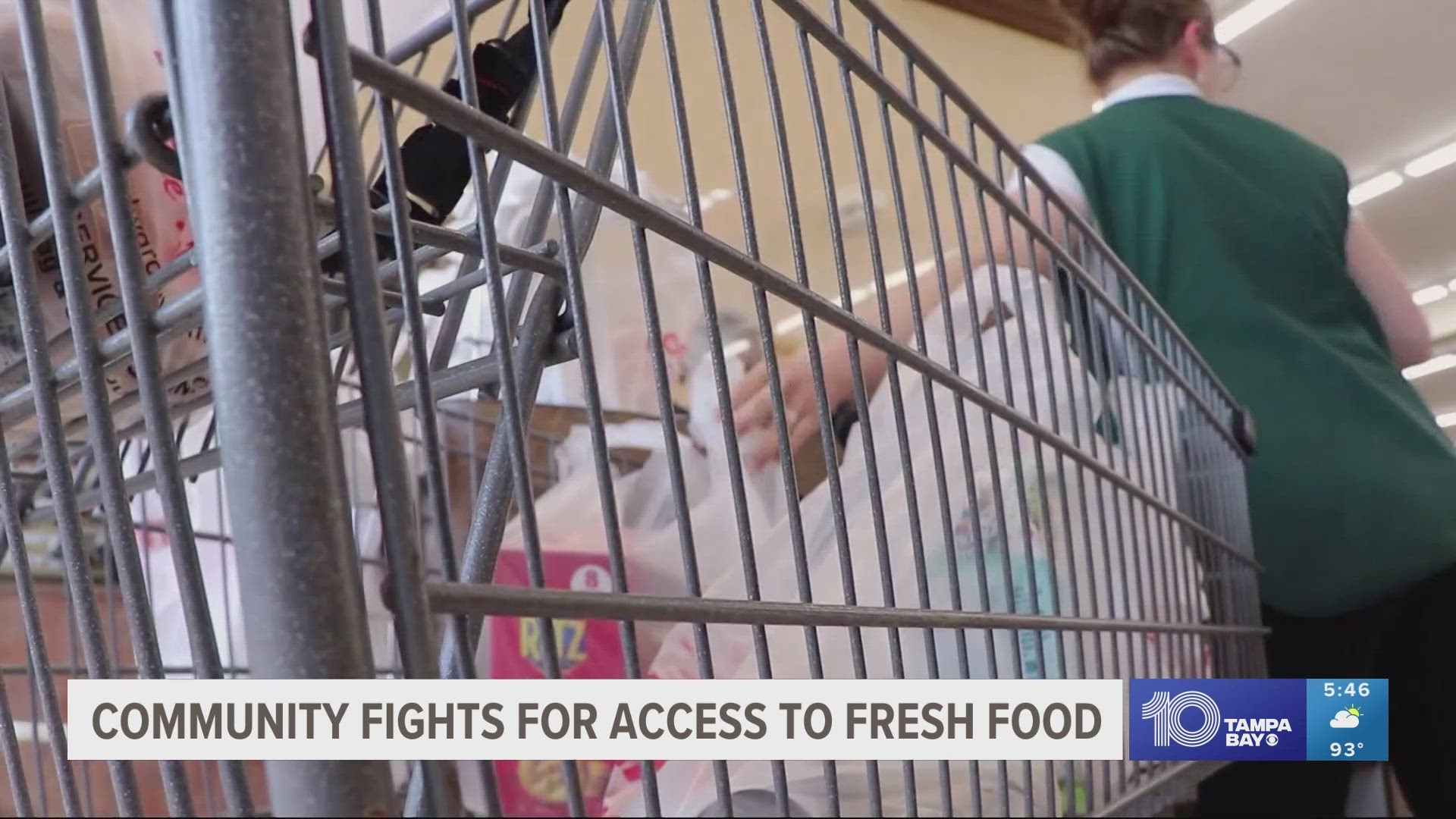ST. PETERSBURG, Fla. — It looks like a haunted site in St. Petersburg.
A giant plaza with a big parking lot, but not one car nor one shopper exists. Just blighted buildings and memories of the old Coquina Key Plaza, where a Save-A-Lot grocery store, pharmacy and various stores once existed.
Now, the nearest major grocer could take at least three miles of a drive west of Interstate-275.
It's something Walter Borden, Bahama Shores Neighborhood Association president, said is a privilege.
"We have an aging community," Borden said.
Some residents may live in waterfront properties in the neighborhood, but Borden said a major part of the community involves seniors and those relying on social security. Borden said he worries about others who may or may not have the means to travel.
"Where do these folks go to get their food? Where do these folks go to get their medicine," Borden said. "This is a food desert."
Borden led the opposition during last year's city council meetings objecting to real estate investment firm Stoneweg's plans for the property. Several neighbors shared concerns about access to a major grocer and amendments to zoning.
The city council approved plans for a mix of housing, workforce and retail, however, a major concern from neighbors was a lack of space and commitment allotted for a grocer that provides fresh and healthy food.
10 Tampa Bay reached out to Stoneweg for comment and an update on their retail space plans, but did not hear back yet.
While proximity to a grocer that provides fresh and healthy foods may help, Dr. Rebecca Johns, associate professor of geosciences at USF, said there are layers that complicate the issue.
"Fundamentally, food insecurity is a problem of poverty," Johns said.
Johns' research looked into how the lack of income can affect one's ability to prioritize fresh and healthy food.
"We don't want people having to choose between, 'Can I buy this good grade of meat for my kids or I could pay the rent?'" Johns said.
Her research also looked into how other factors like transportation to get to a store or mobility, such as the physical capability to move, can hinder one's ability to gain access to fresh food. Crime can also serve as a barrier to accessing needs.
Disparities are also greater among those of lower income and among African Americans. Research, originally published in 2013, looked into long histories of segregation and racial discrimination.
Without access to fresh and healthy food, others must rely on smaller stores that may be overpriced and low in nutritious content.
Johns said years later, the problem has only gotten worse due to inflation and the effects from the pandemic.
That issue motivated those like Kulmalee Alvelo of Harbordale to help launch I Care St. Pete, a nonprofit that works to provide mobile medicine and food drives, among others throughout the area. The goal is to improve overall well-being.
Like many others, Alvelo was among those who moved to Florida during the brunt of the pandemic, however, the needs throughout the area inspired her to take action.
Alvelo connects with other organizations and provides services like dental care or food donations, especially for those experiencing homelessness.
One Saturday in August, Alvelo worked together with those like Eric Jackson, who also lives within the zip code.
Jackson is the founder of S.T.O.R.Y. 727, along with Erinn Green, Steve Medaries and Gary Gaines. Among their missions is to help youth and families in historically excluded neighborhoods throughout the Bay area, but also provide fresh food to different communities.
The feeding program serves more than 200 people weekly and the demand is growing, Jackson said. Part of the process involves connections with big retailers who can provide food before it's thrown away, Jackson explained.
"Food is too expensive. It's just too expensive," Jackson said.
On this day, there's bread from places like Trader Joe's, greens, vitamins, meat and other organic goods available for people.
For Jackson, a native of St. Pete, the efforts to help are personal due to difficult life experiences in the past. That's why being able to step up and help cuts deep.
"The government can only do what it can do, but we can do more by using our own resources and power," Jackson said. "The more that we can share, the more that we can grow, the more that we can heal each other, and we can be an example for other states and other cities."
As communities look after each other, Johns said the issue of food and nutrition insecurity may only get worse without improvements from underlying problems like lack of affordable housing or income.
"If they had that, then they would go and get the food that they needed to get," Johns said.
Policy changes that provide better transportation, raise wages or expand food programs could help in these cases, Johns said. While cities and counties can work to enact more of the needs, Johns said state-level regulation and policies can tie down efforts to do so.
"We're not really getting the underlying issue, which is that people need to have regular, adequate income and health care," Johns said.

